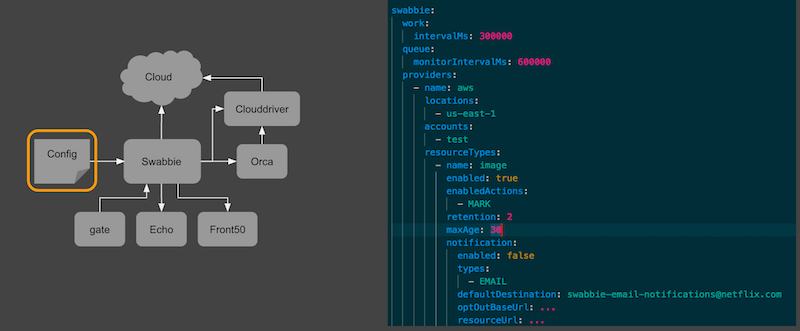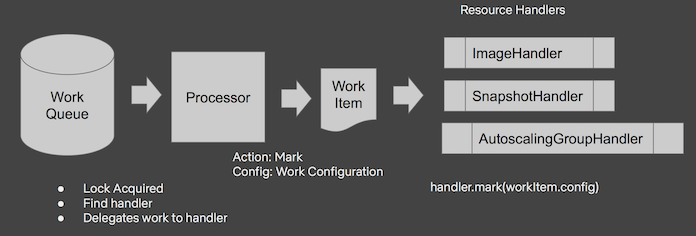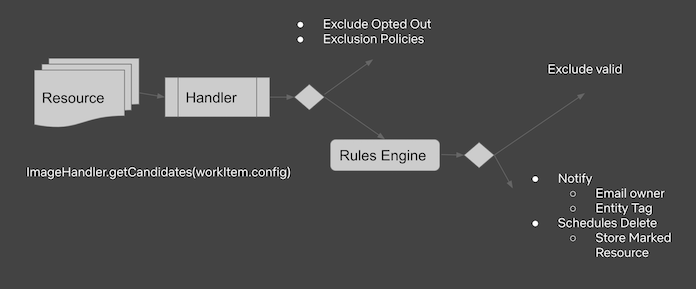spinnaker / Swabbie
Programming Languages
Swabbie
IMPORTANT: This service is currently under development, and is actively being used at Netflix for deleting images, ebs snapshots and auto scaling groups.
Swabbie automates the cleanup of unused resources such as EBS Volumes and Images. As a Janitor Monkey replacement, it can also be extended to clean up a variety of resource types. Swabbie applies a set of rules to mark cleanup candidates. Once marked, a resource is scheduled for deletion, and an owner is notified. Before being deleted the resource is checked again to make sure it still qualifies for deletion. If so, it is deleted.
Deep Dive
For a more detailed understanding of how Swabbie works, visit the internals doc.
How it works
During initialization swabbie schedules work to routinely mark, notify and delete resources. The application configuration is flattened into work items that are placed on the work queue for processing:
YAML config -> Work Items -> Work Queue
Each visited resource is evaluated against the rules engine in order to determine if it should be deleted.
Rules in the rules engine are configurable and can be composed similar to an if/else branch.
They can be defined with an AND (&&), or OR (||) operator:
-
AND: A branch applies if all contained rules apply to the resource being evaluated. -
OR: A branch applies if any rule contained inside the branch applies.
resourceTypes:
- name: serverGroup
enabled: true
enabledRules:
- operator: AND # branch(1)
description: Empty Server Groups that have been disabled for more than than 45 days.
rules:
- name: ZeroInstanceRule
- name: DisabledLoadBalancerRule
parameters:
moreThanDays: 45
- operator: OR #branch(2)
description: Expired Server Groups.
rules:
- name: ExpiredResourceRule
The above configuration translates to the following:
For every resource r of type serverGroup,
r.marked == true => (branch(1) || branch(2)) == true
Or more generally:
r.marked == true => (branch(1) || branch(2) || ... branch(n-1) || branch(n)) == true
As illustrated using defined rules:
if (((ZeroInstanceRule && DisabledLoadBalancerRule) || ExpiredResourceRule) == true)
Resource States:
- Marked:
During the marking process, previously marked resources that no longer qualify for deletion are Unmarked.
-
Notified: Once marked, the resource owner is resolved and notified about the upcoming deletion.
-
Opted-Out: A resource can be explicitly opted out of deletion via API or exclusion policies. Opted out resources are exempt from swabbie actions.
-
Deleted:
Resources are re-evaluated before deletion to ensure they can be safely deleted.
What's supported today
- Cloud Provider: AWS
- Netflix uses Edda
- Vanilla AWS is also supported
- Resource Types:
- AMIs
- Server Groups
- Launch Configurations
- Launch Templates
- EBS Snapshots
- ELBs
- Halyard: Not supported yet (PRs are welcome!)
Contributing
If you're interested in contributing support for other providers or resource types, open an issue or join the Spinnaker Team slack and post in #swabbie.
Areas:
- Testing
- Documentation
- Other cloud provider
- Extensibility
- Plugin support
Running swabbie
Requirements:
- Redis for storage
- Copy config file to a directory of your choice Configuration (maps to SwabbieProperties)
- Update config with your settings and run
./gradlew run -Dspring.config.location=/absolute/path/to/swabbie.yml




